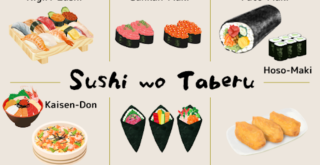
Memorizing vocabulary is an unavoidable part of learning Japanese. Many people may find it difficult or painful to memorize vocabulary. In this article, we will show beginners and intermediate learners how to learn Japanese vocabulary effectively by learning thematic lists and kanji. Read to the end and you will enjoy learning Japanese vocabulary!
Vocabulary list by theme for easy learning

First, let’s look at how to learn vocabulary by theme. Themes refer to situations such as daily life, work/business, and travel/leisure. When you study vocabulary classified by theme, you can connect words that appear in those situations and remember them, which makes learning more efficient. Here is the actual list of vocabulary words by theme.
Daily Life Vocabulary
First, we have compiled a list of common daily life vocabulary related to food, transportation, and shopping. Just by knowing this vocabulary, you will probably be able to catch more words when you watch dramas, movies, and anime. English translations and example sentences are also included.
Food Vocabulary
りんご (ringo) – apple りんごはあかいです。 The apple is red.
さかな (sakana) – fish さかなりょうりをたべました。 I ate fish dishes.
にく (niku) – meat にくとさかなどちらがすきですか? Which do you like better, meat or fish?
たまご (tamago) – egg わたしはたまごアレルギーです。 I am allergic to eggs.
みず (mizu) – water みずをください。 Please give me some water.
パン (pan) – bread ごはんよりパンがすきです。 I prefer bread to rice.
野菜 (yasai) – vegetables 野菜がきらいです。 I don’t like vegetables.
果物 (kudamono) – fruits 果物をかってきてください。Please bring me some fruit.
お茶 (ocha) – tea お茶がのみたいです。 I would like to drink tea.
Transportation Vocabulary
電車 (densha) – train どの電車にのればいいですか? Which train should I take?
バス (basu) – bus バスていはどこですか? Where is the bus stop?
自転車 (jitensha) – bicycle 自転車をかりたいです I would like to borrow a bicycle.
車 (kuruma) – car 車でいけますか? Can I drive a car?
飛行機 (hikouki)) – airplane 飛行機だといくらかかりますか? How much does it cost by airplane?
地下鉄 (chikatetsu) – subway ちかてつでなんぷんかかりますか?
How long does it take by subway?
タクシー (takushii) – taxi タクシーのりばをおしえてください。Please tell me where I can find the taxi stand.
船 (fune) – boat 船にのりたいです。 I’d like to take a boat.
駅 (eki) – station 駅まであるいていけますか? Can I walk to the station?
停留所 (teiryuujou) – bus stop 停留所がみつかりません。I can’t find a bus stop.
Work and Business Vocabulary

Next, we have compiled a list of essential vocabulary for work and business situations. These are vocabulary commonly used in an office and the names of jobs. If you want to learn business Japanese efficiently, please refer to this list as a first step.
Office Terms
机 (tsukue) – desk 机をうごかしてもいいですか? May I move the desk?
椅子 (isu) – chair 椅子がひとつたりません。 There is one chair missing.
コンピューター (konpyuutaa) – computer コンピューターがつきません。 The computer isn’t working.
電話 (denwa) – telephone わたしが電話をとります。 I will pick up the phone.
会議 (kaigi) – meeting あしたのごごに会議があります。 There’s a meeting tomorrow afternoon.
文房具 (bunbougu) – stationery 文房具をかってきます。 I will get some stationery.
プリンター (purintaa) – printer プリンターはどこにありますか? Where is the printer?
ファイル (fairu) – file なにいろのファイルですか? What color is the file?
ペン (pen) – pen ペンをおかりしてもいいですか? May I borrow a pen?
紙 (kami) – paper 紙でていしゅつしてください。 Please hand it in by paper.
Job Titles and Expressions
社員 (shain) – employee あのひともうちの社員です。That person is our employee.
上司 (joushi) – boss 上司とめんだんしました。 I had a meeting with my boss.
部下 (buka) – subordinate 部下にしごとをまかせました。 I entrusted the job to my subordinate.
先生 (sensei) – teacher ちゅうがっこうの先生をしています。 I am a teacher at a middle school.
医者 (isha) – doctor たいちょうがわるいので、医者にみてもらいます。 I have to see a doctor because I don’t feel well.
エンジニア (enjinia) – engineer ことしからエンジニアになりました。 I have been an engineer since this year.
デザイナー (dezainaa) それはデザイナーにおねがいしてください。 Please ask a designer to do that.
受付 (uketsuke) – receptionist 受付にきいてみます。 I’ll ask the receptionist.
セールスマン (seerusuman) – salesman セールスマンがきています。 The salesman is here.
マネージャー (maneejaa) – manager マネージャーとはなしてきてください。 Please go talk to the manager.
Travel and Leisure Vocabulary

Here is some travel and leisure vocabulary related to sightseeing, accommodations, and popular sightseeing activities. If you learn this, it will be useful when you travel to Japan! We’ve also included some useful phrases so you can practice!
Sightseeing Vocabulary
観光地 (kankouchi) – tourist spot おんせんがゆうめいな観光地はどこですか? Which sightseeing spot is famous for its hot spring?
美術館 (bijutsukan) – art museum 美術館までバスでいけますか? Can I take a bus to the museum?
寺院 (jiin) – temple 寺院はちかくにありますか? Is there a temple nearby?
神社 (jinja) – shrine 神社のおみせはなんじまでですか? What time does the stop at the shrine close at?
公園 (kouen) – park 公園でごはんをたべてもいいですか? Can I eat in the park?
動物園 (dobutsuen) – zoo 動物園のチケットはいくらですか? How much is a ticket for the zoo?
展望台 (tenboudai) – observatory 展望台はなんじからですか? What time does the observatory start?
アトラクション (atorakushon) – attraction アトラクションはなんさいからのれますか? What is the minimum age to ride the attraction?
水族館 (suizokukan) – aquarium 水族館でショーがみられますか? Can I see a show at the aquarium?
歴史博物館 (rekishi hakubutsukan) – history museum 歴史博物館はあしたあいていますか? Is the history museum open tomorrow?
Accommodation and Activity Vocabulary
ホテル (hoteru) – hotel ホテルはなんじにチェックアウトですか? What time do you check out of your hotel?
旅館 (ryokan) – traditional Japanese inn 旅館にろてんぶろがありますか? Does the ryokan have an outdoor bath?
ホステル (hosuteru) – hostel これはホステルですか? Is this a hostel?
ゲストハウス (gesutohausu) – guesthouse ゲストハウスにいちばんちかいコンビニはどこですか? Where is the nearest convenience store to the guesthouse?
観光 (kankou) – sightseeing 観光にきました。 I’m here for sightseeing.
ハイキング (haikingu) – hiking ハイキングようのくつがありません。 I don’t have hiking shoes.
ショッピング (shoppingu) – shopping ショッピングできるばしょがありますか? Is there a place where I can go shopping?
スキー (sukii) – skiing スキーはなんがつからできますか? From what month can we start skiing?
温泉 (onsen) – hot spring 温泉にはいりたいです。 I would like to try hot spring.
スポーツ (supootsu) – sports にほんのスポーツをみにいきたいです。 I want to go see some Japanese sports.
Let’s master essential Japanese Kanji

Next, let’s master Japanese Kanji. Japanese language is a mixture of hiragana, katakana, and kanji. If you can understand just a few simple kanji, you will be able to expand your world of Japanese language. From here, we will introduce basic kanji for beginners and essential kanji for intermediate level learners.
Basic Kanji for Beginners
As basic kanji for beginners, we have compiled kanji for numbers, time, place, and direction, which are frequently used in daily life! Numbers have a number of readings, so we introduce the most frequently used ones first. If you are interested, let’s look them up one by one.
Kanji for Numbers and Time
一 (ichi) – one 一じになりました。It’s just turned one o’clock.
二 (ni) – two 二かいにいます。 I’m on the second floor.
三 (san) – three いちにち三かいごはんをたべます。 I eat three times a day.
四 (shi/yon) – four こどもが四(よん)さいになりました。 The child just turned four years old.
五 (go) – five 五にんですんでいます。 There are five people living together.
六 (roku) – six しょうがっこうは六ねんせいまでです。 Elementary schools run til grades 6.
七 (shichi/nana) – seven にじは七(なな)いろです。 The rainbows have seven colors.
八 (hachi) – eight このかいしゃで八ねんかんはたらいています。 I’ve worked for this company for eight years.
九 (kyuu/ku) – nine 九(く)じにしゅっしゃします。 I come into the office at nine.
十 (jyuu) – ten よる十じにねたいです。 I want to sleep at ten o’clock.
Kanji for Places and Directions
上 (ue) – up 上のたなにあります。 It’s located up there.
下 (shita) – down 下のおかしはなんですか? What’s the okashi down there?
右 (migi) – right 右にみえているのは美術館ですか? Is it the museum on the right?
左 (hidari) – left 左にまがってください。 Please turn left.
北 (kita) – north 北かぜがつめたいです。 The north wind is very cold.
南 (minami) – south 南にうみがあります。 There is a sea to the south.
東 (higashi) – east 東にはこうこうがあります。 There is a high school on the east.
西 (nishi) – west 西にむかってください。 Please go toward the west.
中 (naka) – middle としょかんの中にトイレがありますか? Is there a washroom in the library?
道 (michi) – road 道にまよいました。 I am lost.
Intermediate Kanji
Here are some more Kanji for intermediate level learners! You can acquire more concrete knowledge about business by learning kanji arranged by industry or topic. Although the kanji are difficult, those who are interested in business in Japan should get used to them little by little.
Work and Business Kanji
会社 (kaisha) – company しゅうまつは会社がやすみです。 Our company is closed on weekends.
仕事 (shigoto) – work セールスの仕事をしています。 I am doing sales work.
商売 (shoubai) – business これでは商売になりません。 This is not business.
取引 (torihiki) – transaction 三社と取引があります。 I have transactions with three companies.
契約 (keiyaku) – contract 契約がきまりました。 The contract has been finalized.
資本 (shihon) – capital 資本がたりません。 We are short of capital.
経営 (keiei) – management 経営をまなんでいます。 I am learning management.
営業 (eigyou) – sales 営業がとくいです。 I am good at sales.
広告 (koukoku) – advertisement 広告にきょうみがあります。 I am interested in advertisement.
市場 (ichiba) – market 市場にくわしいですか? Are you familiar with the market?
Nature and Environment Kanji
山 (yama) – mountain 山のぼりがすきです。I like mountain climbing.
川 (kawa) – river 川でバーベキューをしました。 I enjoyed barbecuing on the river.
海 (umi) – sea 海でおよぐのがにがてです。 I am not good at swimming in the sea.
森 (mori) – forest 森でキャンプをしましょう。 Let’s go camping in the forest.
空 (sora) – sky 空がくもっています。 The sky is dull.
気候 (kikou) – climate 気候がおだやかです。 The climate is mild.
環境 (kankyou) – environment 環境にいいですね。 It’s good for the environment.
自然 (shizen) – nature 自然をかんじます。 I feel nature.
地球 (chikyuu) – earth 地球をまもりたいです。 I want to protect the earth.
太陽 (taiyou) – sun 太陽がまぶしいです。 The sun is dazzling.
Summary
To effectively increase your Japanese vocabulary, it is important to use thematic lists and learn kanji. Use the thematic list above to learn vocabulary for daily life, work/business, and travel/leisure. In addition, you can improve your Japanese vocabulary by learning kanji for beginner to intermediate level learners! Many of you may have difficulty with kanji, but if you learn them by theme, you will find similar groups. It would be great if you can also enjoy learning the connection between form and meaning.
Furthermore, if you want to try using the vocabulary you have learned in real conversations, we recommend language exchange events. Ohanasi Kagawa offers free online language exchange events on weekends. Japanese and English learners are paired up and switch languages for 15 minutes at a time, so it’s a great environment to teach each other. The rules are well defined so that you can have a pleasant conversation, so even if you are new to participating in online events, you don’t have to worry. If you want to show the results of your studies, please take a look.
That said, you might still not be confident in your Japanese speaking ability. You’re not sure how to study Japanese. For people like that, we are currently offering free Japanese language consultation and free lessons for a limited number of 10 people each month.
You don’t know how to study Japanese. If you are interested in taking Japanese lessons to solve what you don’t understand, please feel free to join us.
If you are interested, please click the URL or image below.
Click here to see more details >>>







